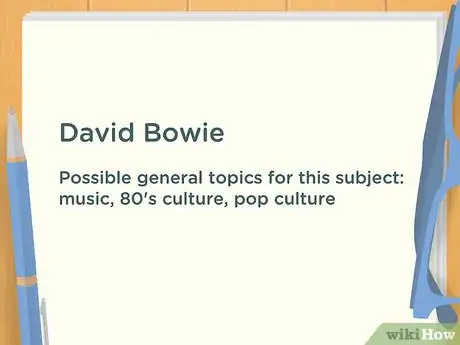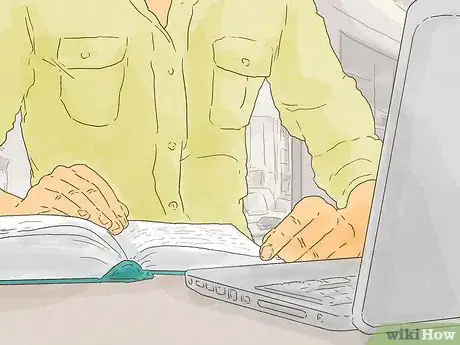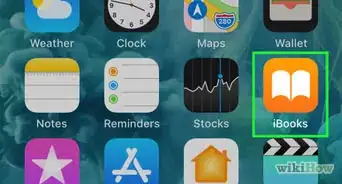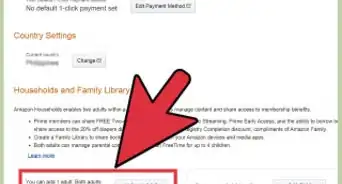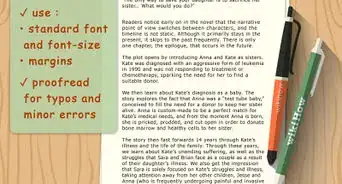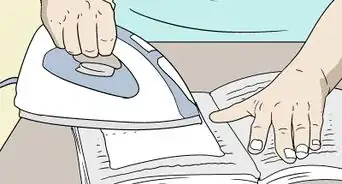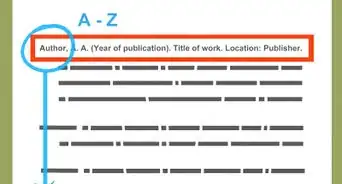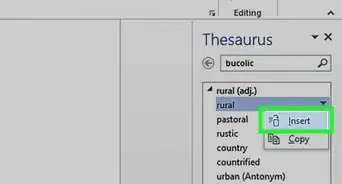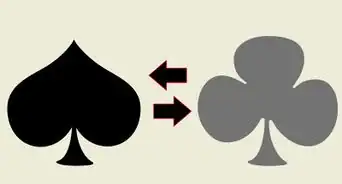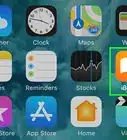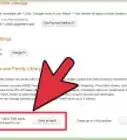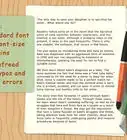This article was co-authored by wikiHow Staff. Our trained team of editors and researchers validate articles for accuracy and comprehensiveness. wikiHow's Content Management Team carefully monitors the work from our editorial staff to ensure that each article is backed by trusted research and meets our high quality standards.
This article has been viewed 47,382 times.
Learn more...
So, you've decided to go old school and use an encyclopedia? Good for you! An encyclopedia is an alphabetical collection of reference information. It is divided into many books (volumes) because of the large number of subjects that are covered. Using an encyclopedia is often the first step in researching a subject, and you can use an online version or a print edition.
Steps
Choosing the Best Encyclopedias
-
1Decide on your subject. If you don't already know your subject, it's a good time to figure it out. With encyclopedias, you may want to start out broad and get more narrow as you go along. For instance, maybe you want to start out looking at the Civil War, but then you may decide to research a specific general.
- You could also start out with something like jazz music and eventually narrow it to a specific jazz musician.
- Alternatively, your topic could be something as broad as biology, but you could eventually narrow down to a specific topic like the study of cacti.
-
2Figure out the more general topic your subject may fall under. Encyclopedias can be general, covering a vast range of knowledge, but they also come in more specific varieties. For instance, the topic of Civil War falls under American history, and you may find a collection of encyclopedias focused just on American History.Advertisement
-
3Look at the collections you have available to you. If you're searching in a library, only certain collections will be available to you. Often, the library will put all the encyclopedias in a special reference section, where you can browse them. However, you can also ask the librarian what collections would best fit your topic. Once you know what's available to you, pick the one that's best for your topic.
- Online, you have a wide variety of options. Your library may have sets of encyclopedias you can only access through their website with login information.[1] However, many encyclopedias are available to everyone for free.
- Encyclopedia Britannica is a great online encyclopedia, though it's only free to read some articles. The Oxford Research Encyclopedias are also a good source, though you'll only have access to some of the articles for free. Encyclopedia.com is a free resource that offers information from a wide variety of encyclopedias.
- World Book Encyclopedia, Oxford, Encyclopedia Britannica, and New World Encyclopedias are all trusted in names in print editions.
-
4Find an age-appropriate collection. If you're in junior high or younger, it may be easier to use an encyclopedia just for kids. However, if you're older, make sure you don't use a kid's encyclopedia, as you'll want something with a bit more depth.
- Infoplease is a good kid's encyclopedia on the internet. National Geographic Kids also has an encyclopedia on animals, while the Ultimate Bugopedia is a good print volume offered by National Geographic.
-
5Find the best quality collection. Most of the time at the library, your librarian will have stocked quality encyclopedias. That means that you just need to find a collection appropriate to your topic. However, you can take steps to find the best quality collection for your topic.
- Pick the most recent additions. They will have more accurate information, as collections are updated all the time.
- Consider bias by checking the publisher. If the publisher or author has a vested interest in a particular viewpoint, they are likely presenting biased information. Also, check the claims are backed up by quality resources by looking at the sources on each article.
- Skip online resources that don't back up their claims. Similarly, a source like Wikipedia can be an okay starting point, but you should check other sources that have experts writing them.
Searching an Electronic Collection
-
1Use the site's search box. Most of the time, you can search an online encyclopedia by entering search terms in a search box on the main page. Pick something that seems to embody your topic to get the most relevant results.[2]
- For instance, to research the Civil War, you might enter "American Civil War."
- Refine your search as needed. For instance, you might have to change "American Civil War" to "U.S. Civil War."
-
2Try Google's search box. You can search within a specific site using Google's search box. This method can be helpful if the site doesn't have a search box, or it doesn't seem to be returning relevant results. Start with your search terms, followed by a space and "site:" followed by the name of the site. Google will only turn up results from that encyclopedia site.[3]
- For instance, if you want to search for the Civil War on encyclopedia.com, you'd type "Civil War site:encyclopedia.com."
-
3Browse by subject. You can also find information by simply browsing, if the encyclopedia is set up for that function. To browse, look for the list of broader subjects, and narrow down to a topic that is relevant to what you want to research.[4]
- For instance, if you're interested in the Civil War, start with "History" in a general encyclopedia. From there, you might click "American History" and then "Civil War."
Searching a Print Collection
-
1Use the spines to find the letter. Go along the spines to find the letter your subject should be under. For instance, if you're looking for "Civil War," your subject will be under "C." Keep in mind that many encyclopedias have so many volumes that some letters may be spread out over multiple volumes.[5]
- For instance, the Civil War might fall under a volume that is "Ci to Co."
-
2Find your subject within the volume. Flip through the volume to find your topic. The subjects are all alphabetical, so you'll find your subject according to its first few letters. Remember, once you've found the section for the first letter, narrow down by the second letter, then the third, and so on.
- For instance, "Civil War" will be alphabetized by "C," then the "i," then the "v," and so on.
- The encyclopedia will have words at the top of the page to show you where you are in the alphabet.[6]
-
3Browse the encyclopedia. You can also simply take down a volume and look through it to find a topic that interests you. Each volume will have a range of topics, even in a more specialized collection, so just look through it until you find something that interests you.
- Try keeping your sessions to twenty or thirty minutes. Flip to something you find interesting, such as an instrument you play or want to play. For instance, you could look up the saxophone just as a place to start.
- Browsing a print collection is actually much easier than browsing an electronic collection because you can easily turn the pages to go through a wide range of subjects.
Community Q&A
-
QuestionHow do you find a date in the encyclopedia? For example, how would I look up the 1500s?
 Community AnswerNumbers typically come before letters. If they aren't in the front, check the index. Google 1500s for possible topics if you can't find anything. It may be too broad a topic for some encyclopedias.
Community AnswerNumbers typically come before letters. If they aren't in the front, check the index. Google 1500s for possible topics if you can't find anything. It may be too broad a topic for some encyclopedias. -
QuestionFor a question like "How many legs does a spider have?", what do I do?
 CraftsmartTop AnswererFind the section of the main topic of your question. So for "How many legs does a spider have?", go to the entry on "Spiders." If that does not have the information, try another topic with a different subject in the question, such as "legs" or a related category such as "arachnids."
CraftsmartTop AnswererFind the section of the main topic of your question. So for "How many legs does a spider have?", go to the entry on "Spiders." If that does not have the information, try another topic with a different subject in the question, such as "legs" or a related category such as "arachnids." -
QuestionWhat is the quickest way of finding information in a multi-volume encyclopedia?
 Community AnswerThe volumes are arranged alphabetically, as are the contents within. Look for the volume that covers the range of the alphabet where your topic falls, then flip through the pages to get to where your topic falls alphabetically within the volume. If your encyclopedia set is not arranged alphabetically then one volume will be an Index, which will be alphabetical. Use that to find the volume and page number of your topic, usually shown as volume number:page range (e.g. 3:365-374).
Community AnswerThe volumes are arranged alphabetically, as are the contents within. Look for the volume that covers the range of the alphabet where your topic falls, then flip through the pages to get to where your topic falls alphabetically within the volume. If your encyclopedia set is not arranged alphabetically then one volume will be an Index, which will be alphabetical. Use that to find the volume and page number of your topic, usually shown as volume number:page range (e.g. 3:365-374).
References
- ↑ https://library.depaul.edu/find/Pages/Encyclopedias.aspx
- ↑ https://www.infoplease.com/frequently-asked-questions#searching10
- ↑ https://www.google.com/intl/br/insidesearch/tipstricks/all.html
- ↑ http://www.okhistory.org/publications/enchowto.php
- ↑ https://www.youtube.com/watch?v=mQc5Om8KW6c&feature=youtu.be&t=23
- ↑ https://www.youtube.com/watch?v=mQc5Om8KW6c&feature=youtu.be&t=46

